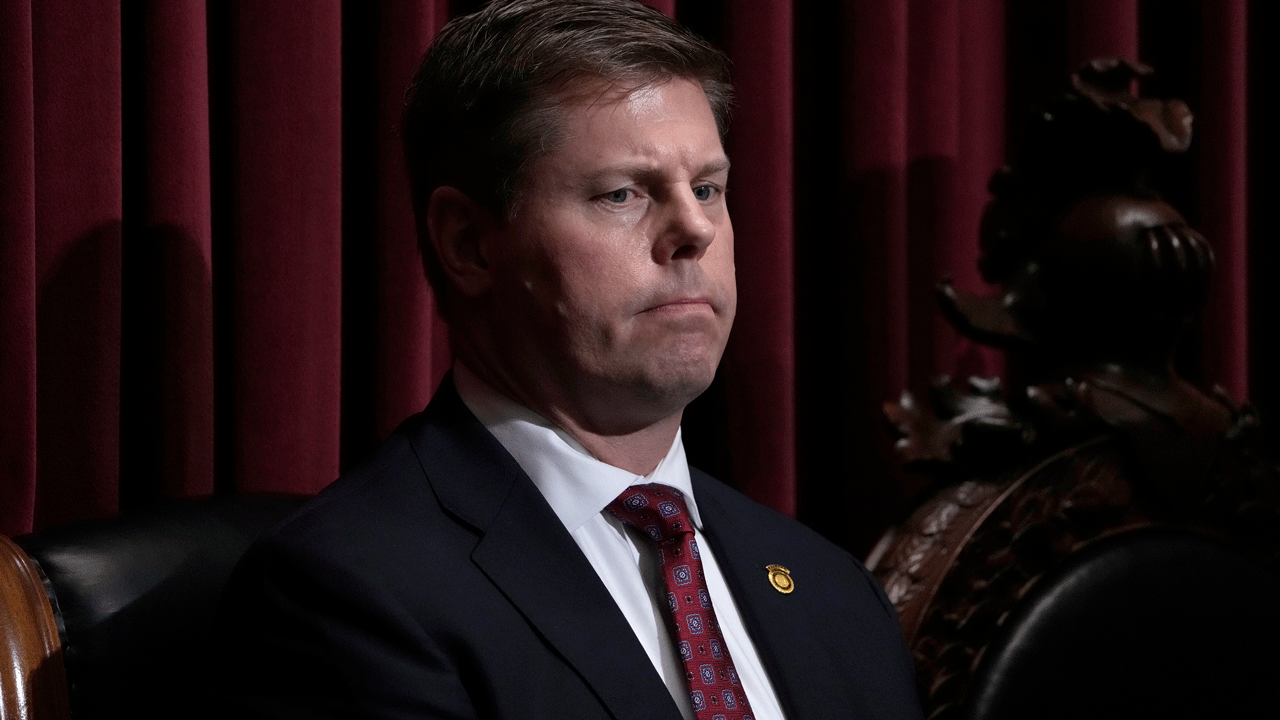Here's something most Republicans fear: "legitimate rape" is this year's version of "macaca."
A political typhoon now churns around Republican Senate nominee Rep. Todd Akin (R-MO) over his "legitimate rape" comment. In fact, there's so much political convection boiling around Akin's Category Five storm that it's siphoned into its vortex the President of the United States, the man who wants to be President of the United States, the presumptive GOP Vice Presidential nominee, the Speaker of the House, and the Minority Leaders of both the House and Senate. Meantime, dozens of GOP House and Senate candidates are experiencing storm surge.
Hurricane Akin has forced all of these figures to comment or distance themselves from the Congressman's remarks that the female body has ways to shut down pregnancies resulting from rape. Meantime, Sen. John Cornyn (R-TX), the senator who heads the national organization devoted to electing Republicans to the Senate, pleaded with Akin to get out of the race for the good of the party. Cornyn declared Akin's remarks "indefensible." Fox's John Brandt reports that Cornyn told Akin that his continued candidacy imperils the GOP's chances of seizing control of the Senate this fall.
Senate Minority Leader Mitch McConnell (R-KY), who hopes he has a promotion in the offing this fall, was blunt about Akin.
"I believe he should take time with his family to consider whether this statement will prevent him from effectively representing our party in this critical election," said McConnell.
In other words, Republicans think they have a great shot at winning the Senate in November. Cornyn and McConnell are essentially saying don't screw this up, Akin.
Democrats currently hold a 53-47 seat edge in the Senate. That includes two independent senators who caucus with the Democrats. The GOP believes it has the potential to flip Democratically-controlled Senate seats in Montana, Virginia, Ohio, Nevada, Wisconsin, North Dakota, Florida, Michigan and Missouri to emerge with the new majority. Of course, running the table is tough. Meantime, Democrats are eyeing Republican-held seats in Massachusetts, Indiana and Maine. It's believed that former Maine Gov. Angus King, the independent candidate there, would caucus with the Democrats if he were to win.
But Akin declared via Twitter that he is "in this race to win. We need a conservative Senate. Help me defeat (Sen.) Claire (McCaskill, D-MO) by donating."
Akin joined Fox's Sean Hannity for his radio program Monday afternoon. With Akin on the line, Hannity wondered aloud if the Missouri Republican had thought this through.
"Democrats now have a ton of ammunition and they are now going to try to use these remarks to hurt everybody they can," Hannity warned. "And if I was put in that position, I would at least be thinking about what is in the best interest of the party. What is in the best interest of, you know, Mitt Romney in this case."
Republicans know it's challenging to pick up seats in Montana, Virginia, Ohio and Michigan. But they were extremely confident that almost any Republican could topple Democrat Claire McCaskill in Missouri. A Missouri win, coupled with a few victories in other states, could propel Republicans to the majority.
Which brings us to the nexus of "legitimate rape" and "macaca."
2006 was a banner year for Democrats. They handily wrestled control of the House from the Republicans after a 12 year hiatus. Democrats did well in the Senate, too. They initially defeated five Republican incumbents. Then-Sen. Jim Talent (R-MO), was among the losers, vanquished by McCaskill herself.
But one election was still out: Virginia.
Then-Sen. George Allen (R-VA) faced re-election against current Sen. Jim Webb (D-VA). Allen was often mentioned as possible GOP presidential timber for 2008. Allen was way ahead in the polls in early August. But that was before a 20-year-old Webb campaign volunteer named Shekar Ramanuja Sidarth became a pivotal figure in the contest.
The Webb campaign deployed Sidarth as a tracker. That means Sidarth travelled to Allen's various campaign events to shoot video - in case the candidate committed a gaffe or said something the Webb camp could use against their adversary.
Sidarth was the only person of color at an Allen campaign event in rural southwestern Virginia when Allen singled him out.
"This fellow here over here with the yellow shirt. Macaca. Or whatever his name is. He's with my opponent. He's following us around everywhere," Allen said. "Let's give a welcome to Macaca here. Welcome to America and the real world of Virginia."
Sidarth is a native Virginian who grew up in the Washington, DC suburbs. Like Allen, he attended the University of Virginia. Unlike Allen who was born in California, Sidarth was born in Virginia. Sidarth is of Indian descent and practiced Hindu.
Allen apologized to Sidarth nearly two weeks after the incident. But "macaca" was now instilled in America's political lexicon. Allen's lead shrunk dramatically. He lost to Webb by three-tenths of a percentage point,. That's about 9,400 votes out of more than 2.3 million cast.
Allen didn't concede the race for a few days. But when he did, Democrats had flipped Virginia's seat from Republican to Democratic. It was the Democrats' sixth pickup of 2006, handing them the keys to the Senate majority.
But Republicans have been down this road before.
2010 was a banner year for the GOP. An electoral tidal wave rewarded Republicans with the House of Representatives. And Republicans whittled away at the Democratic majority, gaining six seats. It was a tall order for Republicans to reclaim the Senate. But it was as strong a Republican year as anyone has ever seen. So taking the majority wasn't out of the question.
Republican John Raese unexpectedly gave Sen. Joe Manchin (D-WV) a run for his money in the bid. But Manchin ultimately emerged victorious in that contest by ten points.
It was largely believed that Republicans were a lock to pick up the Delaware Senate seat held for 36 years by Vice President Joe Biden. Biden's longtime chief of staff Sen. Ted Kaufman (D-DE) was appointed to the seat as a caretaker. There was speculation that Biden's son, Beau might run later. When the younger Biden took a pass, then-Rep. Mike Castle (R-DE) was the odds-on favorite.
Until tea party-supported Christine O'Donnell came along. O'Donnell shocked Castle in the primary.
O'Donnell proved to be a deeply-flawed candidate. She was in debt and owed back taxes. Her dabbling in witchcraft became fodder for late-night comedians.
"Is Christine O'Donnell actually this unhinged from reality? Or is she simply a liar?" asked Delaware Republican party Chairman Tom Ross. "She's not a viable candidate for any office in the state of Delaware. She could not be elected dog catcher."
Sen. Chris Coons (D-DE) was given little chance against Castle. But he trounced O'Donnell in the general election, giving Democrats the old Biden-Kaufman seat.
In Nevada, Republicans were excited at their prospects to level Senate Majority Leader Harry Reid (D-NV). Reid graduated to the top Democratic post in the Senate after Sen. John Thune (R-SD) outdueled then-Senate Minority Leader Tom Daschle (D-SD) in 2004. Republicans thought lightning might strike twice as they went after Reid in 2010. Tea party favorite Sharron Angle topped fellow Republicans Sue Lowden and Danny Tarkanian (son of legendary UNLV basketball coach Jerry Tarkanian) in a spirited primary. But many Republicans found Angle to be too extreme. She declared that Sharia law was in place in suburban Detroit, didn't like the fluoridation of drinking water and opposed all forms of abortion. She said that it was against God's "plan" for a woman to have an abortion, even in cases of rape or incest.
Although Angle led Reid early in the contest, it wasn't enough to defeat the Majority Leader in November.
In Connecticut, Republicans nominated television wrestling icon Linda McMahon to take on then-Connecticut Attorney General Richard Blumenthal (D) for the seat held by retiring Sen. Chris Dodd (D-CT). Many thought Dodd would be vulnerable had he stood for re-election. In the end, Blumenthal cruised to victory, topping McMahon by 12 points.
2010 was a big Republican year. Republicans would hold the majority in the Senate today had they won those seats in West Virginia, Delaware, Nevada and Connecticut, But what was striking was that even in a GOP year, voters found candidates like O'Donnell and Angle to be too extreme.
In other words, little things - like macaca - matter. And the right nominee matters. And this is what worries Republicans with Todd Akin.
Once he became the presumptive Republican standard-bearer, Mitt Romney hoped to focus his campaign on the economy and jobs. He wound up burning precious months talking about Bain Capital and tax returns. Romney squandered more time when he committed a spate of gaffes overseas. With the GOP due to launch its convention next week in Tampa, Republicans want to drive attention to Romney's vision and acquaint Americans with his vice presidential pick, Rep. Paul Ryan (R-WI).
But right now, the Akin story is hijacking some of that valuable press.
While most Republicans are condemning Akin, some are at least relieved that the Akin furor erupted this week and not next. Then it truly would be a distraction from the convention.
But distraction or not, the Akin remarks could imperil the GOP's chances to win the Senate. Republicans are still smarting from 2006. And there's genuine concern in Republican ranks that Akin's "legitimate rape" remark could be the "macaca" moment of 2012.




